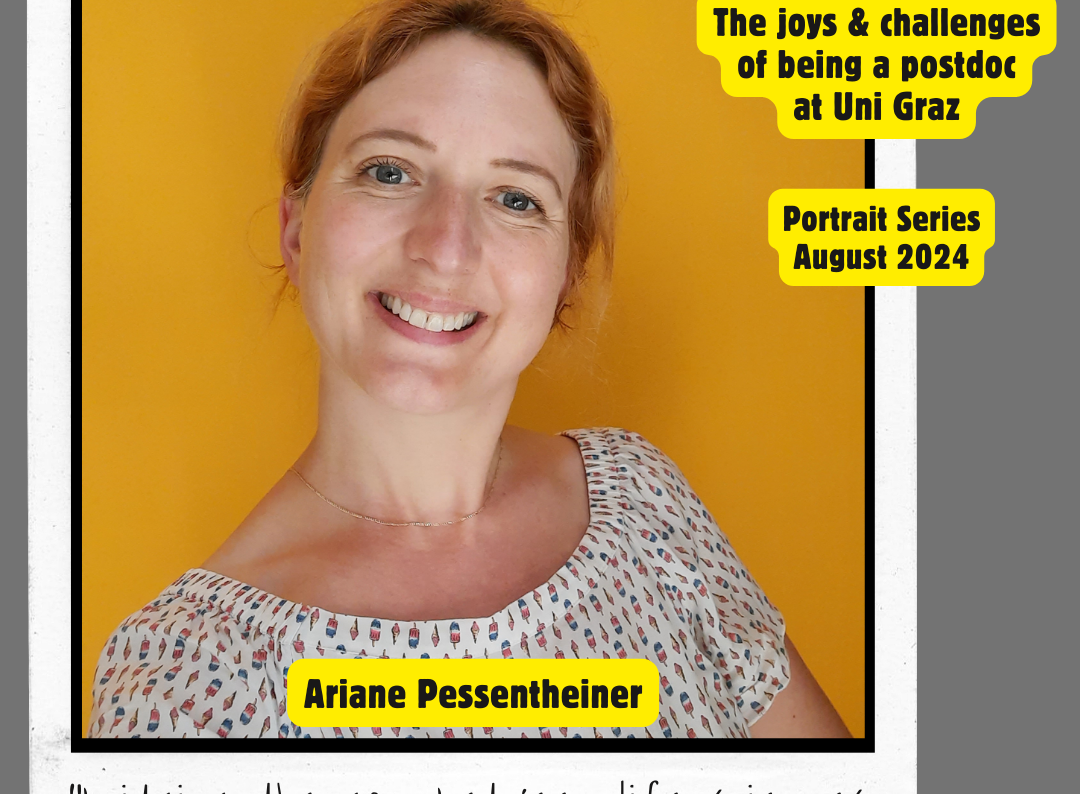This summer, you have the opportunity to get to know some of the brilliant postdoctoral researchers at our university. Our portrait series highlights the diversity within this group of University of Graz research talents - and showcases the fascinating research that they do. Here are four questions for....
Ariane Pessentheiner, Institute of Molecular Biosciences
1) Tell us a little about yourself, and your journey to become a researcher at Uni Graz.
My name is Ariane Pessentheiner, and I am currently a Postdoctoral Researcher at the Institute of Molecular Biosciences. My academic journey has come full circle, bringing me back to where it all began, as I completed my undergraduate and master's studies here at University of Graz. After earning my master's degree, I embarked on an enriching and diverse research journey. I pursued my PhD at the Technical University of Graz, followed by postdoctoral positions at UC San Diego and the Medical University of Graz. Since 2021, I have returned to my alma mater, now contributing in a different and exciting capacity as a science communicator, a role I wouldn’t have thought of during my early academic years.
2) What are you currently researching, and why do you think it is important (or interesting)?
In recent years, my research interests have undergone a significant transformation, shifting from life sciences to the fascinating field of science communication. This shift means that much of the research I engage with is conducted by my colleagues, while my role involves helping them convey their findings in compelling and accessible ways. As a science communicator and trainer, I focus on enhancing the effectiveness and creativity of scientific communication, assisting in graphical representation, and supporting grant writing efforts.
One of my most rewarding projects involves leading a science communication initiative aimed at school children. Through engaging workshops, we use comics as a creative tool to explain complex concepts related to biomembranes, making science approachable and fun for young students. More details about this project can be found on my website https://biophycom.uni-graz.at. Recently, I have also been contemplating starting my own research in science communication, with the goal of empirically evaluating the effectiveness of various communication strategies we employ. This new direction holds great promise for enhancing public understanding and appreciation of science.
3) What gives you joy in your everyday work life & what are some challenges?
The most exciting and also challenging aspect of my research career has undoubtedly been the transition from a traditional research focus to the interdisciplinary field of science communication. This shift required not only acquiring new skills but also adapting to a different professional mindset. Initially, it was daunting to move away from the hands-on research I was accustomed to and to embrace a role that centers on facilitating and enhancing the communication of others' work.
To overcome this challenge, I immersed myself in learning and networking within the science communication community. Attending workshops, conferences, and collaborating with experienced science communicators were crucial steps. I also sought mentorship from experts in the field, which provided invaluable guidance and support. Through perseverance and continuous learning, I managed to bridge the gap between life sciences and science communication, ultimately finding a niche in “Art&Science” where I could make a meaningful impact.
I enjoy that I am still part of the scientific community and that I can now use all my talents—particularly those in communication and creativity. However, a significant challenge is the lack of long-term positions in science communication. Currently, I finance myself part-time through project money, which is a short-term arrangement with limited prospects for extension. I hope that science communication will gain more recognition and stability within the academic field.
4) What's next for you this year/next year?
I am pretty sure that this year, as well as next year stay exciting. I am not really sure where my journey will take me. I am currently taking classes in didactics and higher university education, since I see many overlaps with science communication. I want to contribute to the academic society in one way or another, and this could also include working primarily as a self-employed communication trainer. I am optimistic that I will find a suitable position in the future, where I can continue using my talents for the benefit of all.
Questions: Johanna Stadlbauer, July 2024, Picture credit: Ariane Pessentheiner (privat)
